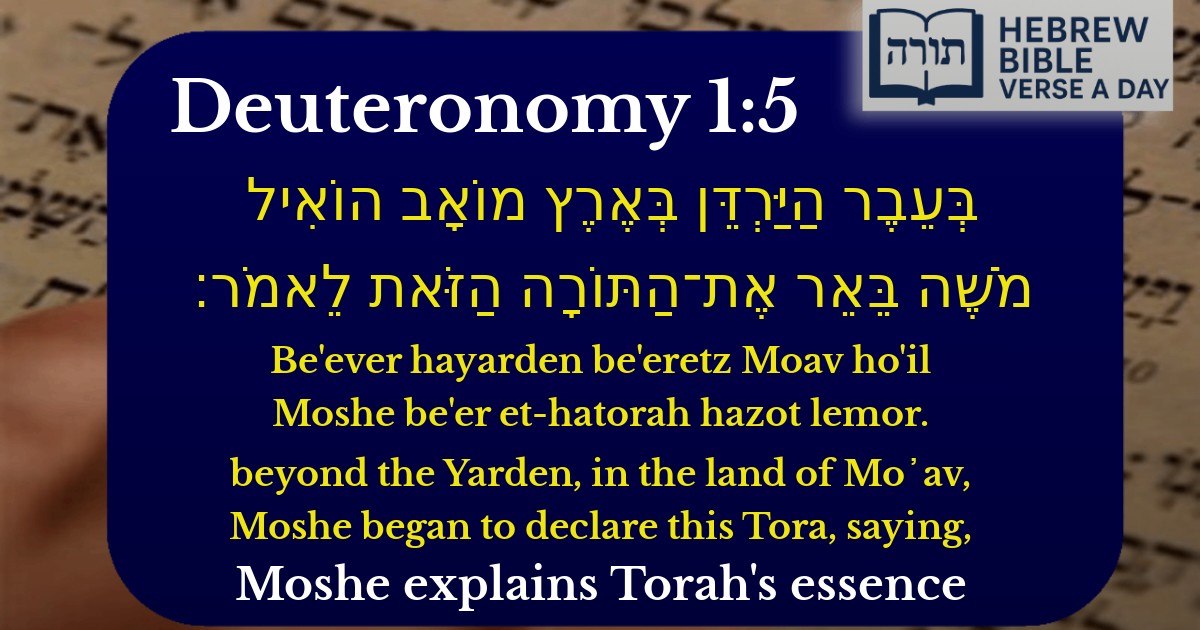Join Our Newsletter To Be Informed When New Videos Are Posted
Join the thousands of fellow Studends who rely on our videos to learn how to read the bible in Hebrew for free!
Hebrew Text
בְּעֵבֶר הַיַּרְדֵּן בְּאֶרֶץ מוֹאָב הוֹאִיל מֹשֶׁה בֵּאֵר אֶת־הַתּוֹרָה הַזֹּאת לֵאמֹר׃
English Translation
beyond the Yarden, in the land of Mo᾽av, Moshe began to declare this Tora, saying,
Transliteration
Be'ever hayarden be'eretz Moav ho'il Moshe be'er et-hatorah hazot lemor.
Hebrew Leining Text
בְּעֵ֥בֶר הַיַּרְדֵּ֖ן בְּאֶ֣רֶץ מוֹאָ֑ב הוֹאִ֣יל מֹשֶׁ֔ה בֵּאֵ֛ר אֶת־הַתּוֹרָ֥ה הַזֹּ֖את לֵאמֹֽר׃
בְּעֵ֥בֶר הַיַּרְדֵּ֖ן בְּאֶ֣רֶץ מוֹאָ֑ב הוֹאִ֣יל מֹשֶׁ֔ה בֵּאֵ֛ר אֶת־הַתּוֹרָ֥ה הַזֹּ֖את לֵאמֹֽר׃
🎵 Listen to leining
Parasha Commentary
📚 Talmud Citations
This verse is quoted in the Talmud.
📖 Megillah 31b
The verse is referenced in the discussion about the reading of the Torah portion 'VeZot HaBerakha' on Simchat Torah, which includes this opening verse of Deuteronomy.
📖 Sotah 13b
The verse is mentioned in the context of discussing where Moses began his final address to the Israelites, emphasizing the location beyond the Jordan in the land of Moab.


Location and Context of the Verse
The verse (Devarim 1:5) describes Moshe Rabbeinu beginning to explain the Torah to Bnei Yisrael in the land of Moav, on the eastern side of the Yarden. Rashi explains that this refers to Moshe translating the Torah into the seventy languages of the world, ensuring that all future generations—including those in exile—would be able to understand it. This act of be'er (explaining or clarifying) was crucial before Bnei Yisrael entered Eretz Yisrael under Yehoshua's leadership.
The Meaning of "Be'er et haTorah"
The phrase "ho'il Moshe be'er et haTorah" (Moshe began to declare this Torah) is interpreted in several ways by our commentators:
Significance of the Location
The verse emphasizes that this took place "b'eiver haYarden, b'eretz Moav" (beyond the Yarden, in the land of Moav). The Midrash (Devarim Rabbah) notes that this was a transitional moment—Moshe was preparing Bnei Yisrael for life without his direct leadership. The location, near the border of Eretz Yisrael, symbolizes the shift from the wilderness experience to the responsibilities of settling the land.
Connection to Sefer Devarim
This verse introduces Sefer Devarim, which is also called Mishneh Torah (Repetition of the Torah). The Rambam (Hilchos Yesodei HaTorah 7:2) explains that Moshe, under divine instruction, reiterated and expanded upon the Torah’s laws to ensure clarity and proper observance. This act of be'er was thus foundational for the transmission of Torah to future generations.